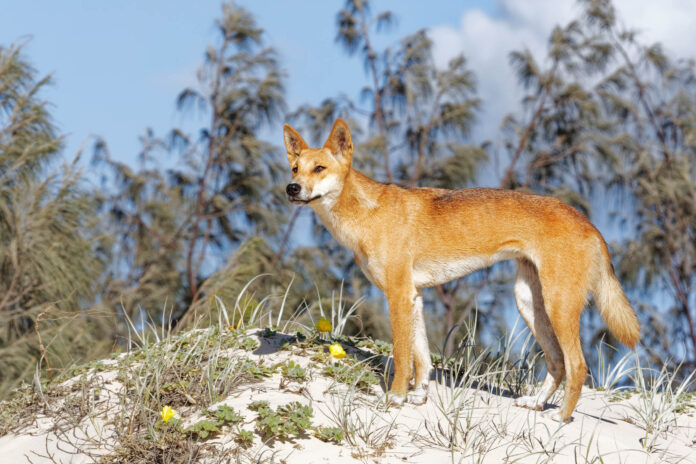The Queensland Parks and Wildlife Service is attempting to identify a dingo (wongari) on K’gari (formerly known as Fraser Island) that bit a German tourist on Wednesday.
The man was part of a group of four who stopped at Gerowweea Creek to check the water depth before driving through.
While checking the depth, the man was approached by a dingo he had not seen. It bit and mouthed his right shin.
The man received a shallow laceration on his shin and jumped onto the bonnet to get away from the dingo before getting into the vehicle.
First aid was provided by the group and the man presented to the Queensland Ambulance Service at Eurong but did not require further treatment.
During an interview with the man, QPWS rangers were advised that the dingo was female. They will attempt to identify the animal.
Rangers will also increase patrols in the area.
It comes after rangers last week fitted a GPS tracking collar to a dingo displaying heightened risk activity and entering a fenced area.
The dingo will wear the collar for the next two months so rangers can track her movements and identify where the animal breaching fence lines.
“The collar will provide regular updates that will help rangers with risk mitigation activities such as increased patrolling and education of people around her,” said Dr Linda Behrendorff from the Department of Environment, Science and Innovation.
“It will also hopefully help pinpoint the specific location where the dingo is entering the fenced area, so rangers can then prevent that access.
“Rangers have spent considerable time maintaining the fence line and monitoring the dingo’s movements daily.
“We have received regular reports about the dingo’s high-risk behaviour, which includes stalking and dominance testing.
“Previous research has shown that people tend to keep their distance from collared dingoes, and visitors to the Eurong area are reminded to Be dingo-safe! at all times.
“This includes always carrying a stick, never walking alone and parents and carers keeping their children close at all times.
“Rangers will continue to provide Be dingo-safe! education to residents and visitors, and I remind people to report all negative dingo interactions to the Queensland Parks and Wildlife Service.
“Collars have been used on K’gari since 2011 for various reasons including research and to track high risk dingoes, and camera collars were used to provide unique insight to their actions and their movements.
“Tracking collars are used in other countries to assist in managing animal/human interactions, and this one will automatically drop off after two months.
“Previously, the tracking collars have not disadvantaged or restricted the dingoes, but experienced rangers will closely monitor its condition across the next two months.”
Visitors and residents on K’gari are reminded to remain vigilant, never walk alone and carry a stick at all times.
Negative dingo encounters should immediately be reported to a QPWS ranger by calling (07) 4127 9150 or emailing dingo.ranger@des.qld.gov.au.
QPWS carries out constant education and compliance activities on K’gari. Rangers maintain fences at multiple camping areas, conduct daily patrols of the island and respond to human-dingo interactions on a case-by-case basis.
Do you have an opinion to share? Submit a Letter to the Editor at Sunshine Coast News via news@sunshinecoastnews.com.au. You must include your name and suburb.





